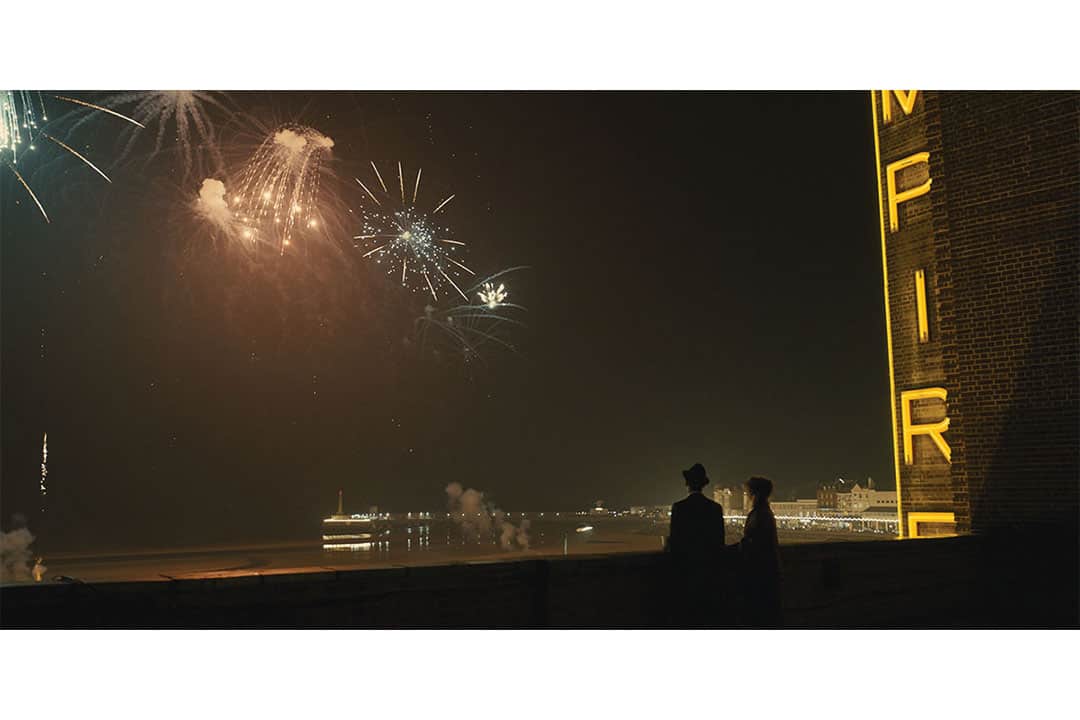After his staggering war epic 1917 that took home multiple Oscars, Sam Mendes graced Toronto International Film Festival (TIFF) 2022 with a quiet, sober rumination on love and identity in 1980s Britain.
Empire of Light, supposedly drawn from Mendes’ personal experiences growing up in England, revolves around the lives of people working at an old, marquee cinema called Empire on the southern coast of the UK. The duty manager of the cinema, Hilary, played by Olivia Colman, leads a rather lonely, uneventful life that is frequented by sexual ordinances with the cinema manager, played by Colin Firth, and the mundane monotony of looking after a remote cinema.
Despite the presence of a vibrant bunch of employees that inhabit various duties around the theatre, Hilary retreats to a reclusive lifestyle that seems to be more a function of her personality than a conscious choice. She makes excuses to get out of meeting her coworkers for drinks, walks out on restaurant appointments, and lies in bed staring aimlessly at the window.
Enter Stephen, played by Micheal Ward, a young Black man who is passionate about studying architecture. While working at the cinema, he quietly transforms Hilary’s life. When Hilary initially shows Stephen around, they stumble upon an abandoned third floor, which becomes the meeting spot for the two over the course of the film.
From having sex to helping an injured bird recover to building sandcastles by the beach, they find love in each other through a variety of activities. But Hilary’s past as a diagnosed schizophrenic patient and Stephen’s racial identity in an unsettling and turbulent political time, catalyzes a fallout in the later stages of the film. Stephen begins seeing an older friend Ruby and a racist mob beats him up, while Hilary descends into further bouts of schizophrenia, culminating in admission to a social services hospital.
Empire of Light seemingly has a very rudimentary plot that is no stranger to the big screen. The writing also feels sketchy at times. For instance, while the relationship between Hilary and Stephen is paramount to the film, it feels convenient and sometimes superficial. Mendes wishes to show the complexity of their relationship while grounding it in their personal conflicts, yet it all comes across as a tad half-baked and haphazard.
What helps the film escape mediocrity is a phenomenal, often heartbreaking, performance by Olivia Colman, powerfully supported by Micheal Ward, Colin Firth, and the rest of the cast. Colman not only embodies the helpless, powerless situations Hilary often finds herself in, but she intricately communicates the rollercoaster of feelings a person diagnosed with schizophrenia might display. She deftly moves from guilt and remorse to playfulness and raging anger. Every time you see her on screen, you discover a new dimension to Hilary’s life and the dire, painful circumstances she often finds herself in.
Another reason the film is propelled to a different league is Roger Deakins’ exquisite, meaning laden cinematography. Deakins crafts frames that correspond with complete precision to the film narrative, and they artistically reflect the rapidly changing tide of emotions to which the audience is privy.
Whether Hilary is lying alone in her bed in a rush of the yellowish red reflected from the curtains or Hilary and Stephen are celebrating New Year’s on the cinema rooftop surrounded by nothing but the colours of the firecrackers and lights, we experience the underlying power of cinematic aesthetic to its full potential. The score complements the film naturally, creating a climactic rumbling noise when Stephen’s character gets beaten up by a mob in the theater.
Toward the end of the film, Stephen leaves for university and for one last time meets Hilary — who is back from her treatment — in a park under the meandering breeze of the trees. She leaves him with a poem that he reads on the train. And as all tragic things are in their own ways, beautiful and fleeting, we are left feeling the power of those specific moments in time that inform our experiences; instead of lamenting over the loss of these moments, we should perhaps come to cherish them.
Empire of Light is a medium to shine the light on our souls in times of division, hate, and personal change. It stands tall, much like the Empire on the coast, and invites everyone to enter a state of anonymity engulfed in darkness to quietly discover themselves as they lay bare to the power of cinema and life.


